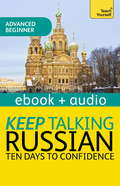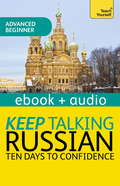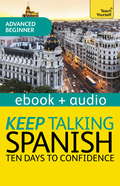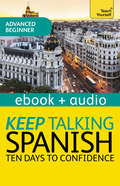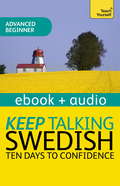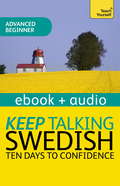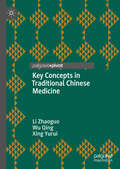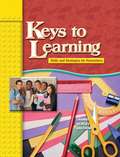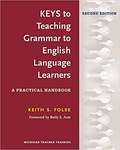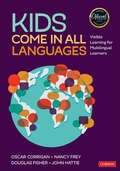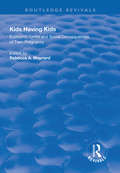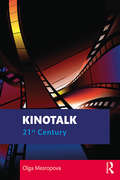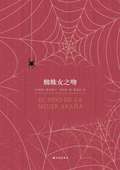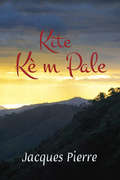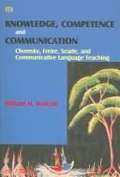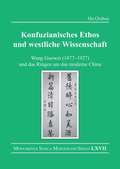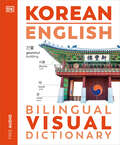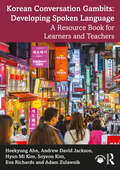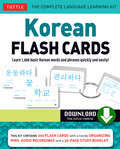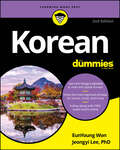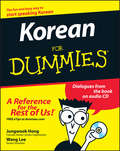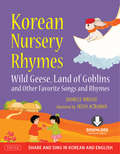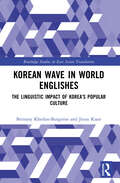- Table View
- List View
Keep Talking Russian - Ten Days to Confidence: Enhanced Edition
by Rachel FarmerIf you already have the basics and want to learn more Russian, this advanced beginner audio course will boost your confidence to understand and speak Russian.Practise the most frequent words and expressions for:-being a guest-shopping for food and drink-finding your way around and using transport-reserving a table-talking about what you do-telling people about where you live-going out-discussing haves and have nots-going to a party-going to the doctor's.You'll progress in your understanding by working out language patterns for yourself, personalise your Russian with interactive role-plays and perfect your pronunciation to sound more natural.Keep Talking Russian - Ten Days to Confidence maps to A1 of the Common European Framework of Reference (CEFR) for languages.Rely on Teach Yourself, trusted by language learners for over 75 years.
Keep Talking Russian - Ten Days to Confidence: Enhanced Edition
by Rachel FarmerIf you already have the basics and want to learn more Russian, this advanced beginner audio course will boost your confidence to understand and speak Russian.Practise the most frequent words and expressions for:-being a guest-shopping for food and drink-finding your way around and using transport-reserving a table-talking about what you do-telling people about where you live-going out-discussing haves and have nots-going to a party-going to the doctor's.You'll progress in your understanding by working out language patterns for yourself, personalize your Russian with interactive role-plays and perfect your pronunciation to sound more natural.Keep Talking Russian - Ten Days to Confidence maps to A1 of the Common European Framework of Reference (CEFR) for languages.Rely on Teach Yourself, trusted by language learners for over 75 years.
Keep Talking Spanish Audio Course - Ten Days to Confidence: Enhanced Edition
by Angela HowkinsIf you already have the basics and want to learn more Spanish, this advanced beginner audio course will boost your confidence to understand and speak Spanish.Practise the most frequent words and expressions for:-explaining where you are from-describing your job-telling the time-booking a table-taking the bus-phoning for a taxi-calling a plumber-shopping in the market-buying clothes-buying shoes.You'll progress in your understanding by working out language patterns for yourself, personalize your Spanish with interactive role-plays and perfect your pronunciation to sound more natural.This advanced beginner Spanish course contains an MP3 CD. You can download the audio files on this disc from your computer to your MP3 player or play it in an MP3 CD player. Also included is a handy phrasebook and a PDF coursebook for reading and writing practice.Keep Talking Spanish - Ten Days to Confidence maps to A1 of the Common European Framework of Reference (CEFR) for languages.Rely on Teach Yourself, trusted by language learners for over 75 years.
Keep Talking Spanish Audio Course - Ten Days to Confidence: Enhanced Edition
by Angela HowkinsIf you already have the basics and want to learn more Spanish, this advanced beginner audio course will boost your confidence to understand and speak Spanish.Practise the most frequent words and expressions for:-explaining where you are from-describing your job-telling the time-booking a table-taking the bus-phoning for a taxi-calling a plumber-shopping in the market-buying clothes-buying shoes.You'll progress in your understanding by working out language patterns for yourself, personalize your Spanish with interactive role-plays and perfect your pronunciation to sound more natural.This advanced beginner Spanish course contains an MP3 CD. You can download the audio files on this disc from your computer to your MP3 player or play it in an MP3 CD player. Also included is a handy phrasebook and a PDF coursebook for reading and writing practice.Keep Talking Spanish - Ten Days to Confidence maps to A1 of the Common European Framework of Reference (CEFR) for languages.Rely on Teach Yourself, trusted by language learners for over 75 years.
Keep Talking Swedish - Ten Days to Confidence: Enhanced Edition
by Regina HarkinIf you already have the basics and want to learn more Swedish, this advanced beginner audio course will boost your confidence to understand and speak Swedish.Practise the most frequent words and expressions for:-going to a funfair-taking a boat trip to the archipelago-going to the swimming pool-chatting in the sauna-asking for directions to the pharmacy-getting directions to a restaurant-going to a nightclub-making plans to meet-being invited to a friend's house-having a dinner conversation.You'll progress in your understanding by working out language patterns for yourself, personalize your Swedish with interactive role-plays and perfect your pronunciation to sound more natural.Keep Talking Swedish - Ten Days to Confidence maps to A1 of the Common European Framework of Reference (CEFR) for languages.Rely on Teach Yourself, trusted by language learners for over 75 years.
Keep Talking Swedish - Ten Days to Confidence: Enhanced Edition
by Regina HarkinIf you already have the basics and want to learn more Swedish, this advanced beginner audio course will boost your confidence to understand and speak Swedish.Practise the most frequent words and expressions for:-going to a funfair-taking a boat trip to the archipelago-going to the swimming pool-chatting in the sauna-asking for directions to the pharmacy-getting directions to a restaurant-going to a nightclub-making plans to meet-being invited to a friend's house-having a dinner conversation.You'll progress in your understanding by working out language patterns for yourself, personalize your Swedish with interactive role-plays and perfect your pronunciation to sound more natural.This advanced beginner Swedish course contains an MP3 CD. You can download the audio files on this disc from your computer to your MP3 player or play it in an MP3 CD player. Also included is a handy phrasebook and a PDF coursebook for reading and writing practice.Keep Talking Swedish - Ten Days to Confidence maps to A1 of the Common European Framework of Reference (CEFR) for languages.Rely on Teach Yourself, trusted by language learners for over 75 years.
Key Concepts in Traditional Chinese Medicine
by Li Zhaoguo Wu Qing Xing YuruiThis book offers a comprehensive overview of Chinese medicine terminology translation, defining the most central concepts in Chinese traditional medicine, providing simplified Chinese characters, Mandarin Pronunciation in pinyin, citations for 111 of the most key concepts in traditional Chinese medicine and culture. Covering definitions of terms relating to essence, qi, yin-yang theory, five elements and visceral manifestation in traditional medicine, it offers a selection of English versions of each term in addition to a standard English version, drawing on the translation history of traditional Chinese medicine. It provides a useful resource to understand the fundamental terms of traditional Chinese medicine and culture in Chinese and English, and their relevance to cross-cultural discourse.
Keys To Learning: Skills And Strategies For Newcomers
by Anna Uhl Chamot Kristina A. Anstrom Catharine W. KeatleyKeys to Learning: Skills and Strategies for Newcomers, by Anna Uhl Chamot, Catharine W. Keatley, and Kristina Anstrom, provides middle and high school newcomers with the skills and strategies to make a great start in reading, writing, and grammar. Research-based and standards-driven,Keys to Learninggives newcomers step-by-step tools for developing their academic skills and becoming successful lifelong learners. Using a four-skills approach, students gain solid foundation in essential skills and strategies through authentic literature and informational readings. Keys to Learningbuilds skills and experiences needed to develop literacy and bring students up to speed for academic learning.
Keys to Teaching Grammar to English Language Learners: A Practical Handbook
by Keith S. Folse Betty S. AzarKeys to Teaching Grammar to English Language Learners: A Practical Handbook is not intended to be an exhaustive reference book about ESL grammar. Written for classroom teachers (K-12, ESL, EFL), this book teaches the most common ESL grammar points in an accessible way through real ESL errors together with suggested teaching techniques. Relevant grammar terminology is explained. <P><P> The four objectives of this book are to help teachers: (1) identify common ESL grammar points and understand the details associated with each one; (2) improve their ability to answer any grammar question on the spot (when on the “hot seat”); (3) anticipate common ESL errors by grammar point, by first language, and/or by proficiency level; and (4) develop more effective grammar/language learning lessons. These objectives are for all teachers, whether they are teaching grammar directly or indirectly in a variety of classes – including a grammar class, a writing class, a speaking class, an ESP class, or a K-12 class. <P><P> In the Second Edition, all chapters have been updated and substantively revised. The number of marginal (gray) boxes with tips and extra information has doubled. A 16th Key, on Negating, and three new appendixes have been added. One of the new appendixes provides a sample exercise from an actual ESL textbook plus relevant notes about the designing of grammar activities and suggestions for teaching each grammar point. <P><P> Also added to each Key is a section on the vocabulary items (e.g., collocations) that are related to the teaching of that particular grammar point. This information is unique to this edition and cannot be found elsewhere on the market. <P><P> The Workbook for the Second Edition (978-0-472-03679-0), available in 2017, includes numerous activities that practice the essentials of grammar and issues relevant to ESL teachers.
Kids Come in All Languages: Visible Learning for Multilingual Learners (Corwin Literacy)
by Douglas Fisher Nancy Frey John Hattie Oscar CorriganEverything you need to create a high-trust, high-achieving learning environment for multilingual students We have never known more than we do now about teaching multilingual students — nevertheless, we teeter on the edge of retreating to old-think practices. The next generation depends upon our getting this right, and this spare, salient guide helps ensure we do. Kids Come in All Languages provides teachers and leaders with all they need to design high-quality curriculum to support multilingual learners. With this book, learn to: Create a low-anxiety, high-expectation classroom climate that gives multilingual students access to engaging grade-level content Plan clear, cohesive lessons and tasks that motivate students to produce language, use critical thinking skills, and access complex texts Offer ample time for student-led talk that ramps up knowledge and amps up a sense of belonging Use heterogeneous, flexible grouping so children acquiring English don’t stall out in fixed-mindset, below-grade level groups And much more Teachers act like tributaries, helping learners access a wider stream of knowledge, and catch the swift current of wanting to learn. It’s time to envision this expansiveness for multilingual students. It’s time to design learning experiences with optimism for their futures.
Kids Come in All Languages: Visible Learning for Multilingual Learners (Corwin Literacy)
by Douglas Fisher Nancy Frey John Hattie Oscar CorriganEverything you need to create a high-trust, high-achieving learning environment for multilingual students We have never known more than we do now about teaching multilingual students — nevertheless, we teeter on the edge of retreating to old-think practices. The next generation depends upon our getting this right, and this spare, salient guide helps ensure we do. Kids Come in All Languages provides teachers and leaders with all they need to design high-quality curriculum to support multilingual learners. With this book, learn to: Create a low-anxiety, high-expectation classroom climate that gives multilingual students access to engaging grade-level content Plan clear, cohesive lessons and tasks that motivate students to produce language, use critical thinking skills, and access complex texts Offer ample time for student-led talk that ramps up knowledge and amps up a sense of belonging Use heterogeneous, flexible grouping so children acquiring English don’t stall out in fixed-mindset, below-grade level groups And much more Teachers act like tributaries, helping learners access a wider stream of knowledge, and catch the swift current of wanting to learn. It’s time to envision this expansiveness for multilingual students. It’s time to design learning experiences with optimism for their futures.
Kids Having Kids: Economic Costs and Social Consequences of Teen Pregnancy (Routledge Revivals)
by Rebecca A. MaynardPublished in 1997. Adolescent mothers are more likely to encounter a variety of economic and social ills than women who delay childbearing until they are adults. This work is a comprehensive examination of the extent to which these undesirable outcomes are attributable to teen pregnancy itself rather than to the wider environment in which most of the pregnancies and the subsequent child-rearing take place. It also examines the consequences of adolescent pregnancy for the fathers of children, and even more importantly, for the children themselves.
Kinotalk: 21st Century
by Olga MesropovaKinotalk: 21st Century is a cinema-based textbook that enhances students’ linguistic and cultural proficiency through guided studies of 12 Russian feature films released since the year 2000. Each chapter includes a series of original readings and activities that present captivating and thought-provoking frameworks in which students of Russian can practice and perfect all four language skills. While providing active stimuli for language production, the volume also aims to immerse students in the world of Russian cinema, society, and culture. Key features include: A broad cross-section of prominent films, directors, cinematic styles, trends, and genres that have emerged in Russia since 2000. A wide selection of authentic texts from Russian scholars and film critics that familiarize students with the language of critical film inquiry in Russian. A multi-disciplinary approach that combines close readings of individual films with considerations of the socio-political, ideological, and economic contexts of their production. A flexible and dynamic modular structure that allows instructors to pick and choose films and topics that are best suited for their classrooms. Aimed at the Intermediate-High to Advanced levels (B1-C1, CEFR levels), this textbook is designed for all those interested in the rich palette of voices, genres, and contexts of 21st-century Russian cinema.
Kiss of a Spider Woman (Mandarin Edition)
by Manuel PuigIn the still darkness of their cell, Molina re-weaves the glittering and fragile stories of the film he loves, and the cynical Valentin listens. Valentin believes in the just cause which makes all suffering bearable; Molina believes in the magic of love which makes all else endurable. Each has always been alone, and always - especially now - in danger of betrayal. But in cell 7 each surrenders to the other something of himself that he has never surrendered before. 在阿根廷布宜诺斯艾利斯监狱的一间牢房里关押着两个囚犯 一个是政治犯瓦伦丁 另一个是同性恋者莫利纳 特务机关派到瓦伦丁身边的卧底 两人之间展开了一场奇妙的对话 呈现出一幅幅电影与现实交错的画面 本书1976年发表后 被翻译成多种文字 小说的魅力迅速蔓延开去 转化到各种表现形式 歌舞剧多年来久演不衰 成为百老汇经典 改编的电影产生过巨大的影响
Kite Kè m Pale
by Jacques PierreIn his latest collection of poetry, Kite Kè m pale (Let My Heart Speak), Jacques speaks lovingly and eloquently about those, including women, who have faced and continue to face difficulties and injustice. His poetry sometimes resorts to uncommon forms of Kreyòl such as jagon and bolit to better expressed that which cannot conveyed commonly, and expose everyone to the linguistic wealth of the country.
Kite Kè m Pale
by Jacques PierreJacques Pierre louvri kè l de batan nan Kite kè m pale pou l envite nou viv kouman entimite ak pwoblèm sosyal pran randevou nan menm kalfou. Powèt la fotografye difikilte ak kouran santiman ki travèse lavi medam yo. Epi, li wete chapo li byen ba pou li salye kouraj Martin Luther King Jr, Malcolm X, ak lòt lidè ki pa te pè batay pou yon minorite ki pran nan cho, e yo mete nan kacho souvan poutèt po yo. Pou fini, li envite nou viv de twa powèm nan langaj jagon ak bolit, epi yon katafal lòt ki fè yonn ak pafen lawouze nou jwenn nan bèl lang nou an.Rekèy powèm sa a se yon envitasyon otè a fè nou tout pou nou dekouvri bèlte lang nou an. Nan chak grenn mo, otè a plonje kè nou nan lanmè Karayib la, kote vag yo fè nanm nou tonbe nan yon ale vini jouk kouran lanmou an rale nou pou nou fè yonn ak powèm yo. -Wedsly Turenne GuerrierLang nou ak kilti nou se rezilta kreyativite nou ki pran nanm nan lavi chak kretyen vivan. Se sa potorik otè Jacques Pierre fè nan rekèy sa a. Pierre marinen lang nou ak kilti nou ansanm pou ofri nou yon konsonmen kreyativite ki se temwayaj richès kiltirèl ak lengwistik Ayiti cheri nou an. -Marky Jean-Pierre
Knowledge, Competence, and Communication: Chomsky, Freire, Searle, and Communicative Language Teaching
by William H. WalcottIn Knowledge, Competence, and Communication, author William H. Walcott debates the meaning of creating equitable and critical instructional practices by exploring diverse representations of knowledge. He covers both historically important topics and current issues: such as colonialism, multiculturalism, gender and language learning, and popular culture. He then presents a systematic and painstaking assessment of Noam Chomsky's and Paulo Freire's theories of knowledge and their educational relevance. In the end, Walcott makes his case for the Freireian approach-conscientizacao; it is the Freireian, with its sociological connection (necessitated by the global context of inequality), which, he believes, needs take precedence as a pedagogical practice.
Konfuzianisches Ethos und westliche Wissenschaft: Wang Guowei (1877-1927) und das Ringen um das moderne China (Monumenta Serica Monograph Series)
by Hu QiuhuaThis study in German offers profound insights into the life and thoughts of Wang Guowei (1877-1927). Like many intellectuals who strongly perceived the necessity of reforms in the waning years of the Late Qing dynasty, i.e. after the Opium wars, Wang sought to strengthen China's position against foreign, in particular Western, powers. Contrary to earlier approaches, which either advocated a close adherence to Confucian traditions or tried to adapt only elements of Western material culture, mainly industrial and military technology, Wang Guowei aimed at reviving traditional Chinese culture by analysing its source texts using a modern scientific approach (and thereby started the discipline of guoxue [national studies]) and simultaneously adapting compatible elements of Western immaterial culture. Thus, Wang became known as an authority on Chinese paleography as well as on German philosophy, especially Kantian epistomology.
Korean - English Bilingual Visual Dictionary (DK Bilingual Visual Dictionaries)
by DKLearn more than 6,000 useful words and phrases in Korean with this engaging illustrated dictionary.The Korean English Bilingual Visual Dictionary is your essential companion to learning Korean - from the million-copy bestselling Bilingual Visual Dictionary series. This handy pocket-size guide has over 6,750 fully illustrated words and phrases in Korean and English, along with a free bilingual audio app. Learn all the words and phrases you need to buy food and clothes, talk about work and education, visit the doctor, go to the bank, use public transport, and much more.This Korean-English visual dictionary includes:A fully illustrated bilingual guide for adults.Updated and revised content with new images and vocabulary.A fully updated audio app that allows you to hear all words in both languages.A new edition from the global bestselling Bilingual Visual Dictionary series.Perfect for students, tourists, and business travelers, the dictionary is incredibly easy to follow, with thematically organized vocabulary so you can find closely related words on a particular topic.Words and phrases are illustrated with full-color photographs and artworks, helping to fix new vocabulary in your mind. The supporting audio app enables you to hear all the words and phrases spoken out loud in both languages to help you learn, remember, and pronounce important vocabulary.
Korean Conversation Gambits: A Resource Book for Learners and Teachers
by Soyeon Kim Adam Zulawnik Andrew David Jackson Heekyung Ahn Hyun Mi Kim Eva RichardsKorean Conversation Gambits: Developing Spoken Language provides specific linguistic and communicative strategies that help Korean language learners engage in daily conversations as well as discussions and negotiations in work and academic contexts. The book presents, and provides practice in, spoken Korean gambits that will help speakers organise their conversations and frame the type of extended discourse that is common in spoken Korean. The book introduces students to strategies for getting thinking time, dealing with breakdowns in comprehension, asking for and providing clarification, exemplifying, floor-holding, interrupting, checking understanding, disagreeing, reformulating and organising longer stretches of discourse; for example, when giving presentations, telling stories or providing self-introductions. Korean Conversation Gambits: Developing Spoken Language comes complete with classroom-ready practice materials.This textbook can be used as a resource by both teachers and Korean learners from introductory to intermediate and proficient levels.
Korean Flash Cards: Learn 1,000 Basic Korean Words and Phrases Quickly and Easily!
by Soohee Kim Woojoo KimEverything needed to learn to read, write, speak, and understand the basic and most useful words in the Korean language is in this handy set of flash cards-including many hundreds of phrases and sentences using them.<P><P> The cards in this volume are a great way to learn Korean and contain the most common words and expressions used in daily Korean communication-concrete nouns as well as verbs and adjectives that form the core Korean vocabulary. These are grouped thematically to enable easy memorization and retention. A sample sentence is given to illustrate the use of the main word on each card which is often a well-known Korean saying or an idiom.Each card features on the FRONT: Main word, plus 4 related words and phrases to help you use it....And on the BACK: Main word and related words' English meanings, Korean script and romanizations. A sample sentence in Korean, romanization, and English translation.
Korean For Dummies
by EunYoung Won Jeongyi LeeLearn Korean with the engaging Dummies method You love the culture, and you love the language. Korean For Dummies helps you get the basics of Korean so you can communicate successfully, even if you've never studied another language before. This fun guide will help you get the hang of spelling, vocabulary, and grammar, so you can travel, do business, or just enjoy learning something new. Online audio content gives you a well-rounded Korean language learning experience and helps you improve your pronunciation and listening skills. Plus, you'll learn key vocab for common situations you'll encounter while traveling in Korea. Learn Korean alphabets and sounds so you can communicate authentically Dip into the culture and history of North and South Korea Master numbers, verb tenses, travel expressions, and beyond Practice, practice, practice your Korean with included audio resources Beginner students or those wanting to better their Korean reading, writing, and speaking skills will find what they need in Korean For Dummies
Korean For Dummies
by Jungwook Hong Wang LeeStart speaking Korean the fun and easy way with Korean For Dummies, a no-nonsense guide to Korean culture and the basics of Korean language. Pick up basic phrases and commonly used words so that you can converse with Koreans in both business and personal situations. You'll learn Korean for everyday life and task-specific expressions for Korean on the go. In addition, you'll discover important and fascinating aspects of Korean culture.This handy guide won't burden you with lists of grammar rules; just look up the phrases and cultural phrases that you need or read through the whole book for a general overview. You'll be able to place material in a daily context with cultural tidbits, phonetic spelling of Korean words, and the recorded Korean dialogues on the accompanying CD. Exercises will jog your memory and reinforce everything that you learn. Find out how to:Use basic phrases and words correctlyConverse intelligently about Korean cultureDo business with a Korean companySay task-specific expressionsPronounce Korean wordsPut material in a real-world contextMake a good first impression with KoreansComplete with lists of ten ways to learn Korean quickly, ten phrases to make you sound Korean, ten expressions that Koreans like to use, and ten things you should never do around a Korean, Korean For Dummies is your one-stop guide to speaking basic Korean and understanding the fundamentals of Korean culture.
Korean Nursery Rhymes
by Danielle Wright Helen AcramanA charming collection of fourteen well-loved rhymes, Korean Nursery Rhymes is the perfect introduction to Korean language and culture for young readers.This beautifully illustrated book features songs and rhymes perfect for children who are interested in learning the Korean language or about its culture. Presented in both English and Korean, this multicultural children's book also includes an audio CD with recordings of kids singing in both languages -- songs so lively and sweet, you'll soon find yourself singing along! Many accompany everyday play activities like jum rope and hand clap games. Others speak to a child's view of nature, and a love of home.Favorite rhymes and songs include: Little One Monkey's Bottom Twirling Round Spring in My Hometown And more!For preschoolers and beyond, this book will be a joy to the mind, the eye, the ear and the heart.
Korean Wave in World Englishes: The Linguistic Impact of Korea's Popular Culture
by Jieun Kiaer Brittany Khedun-BurgoineThis book examines the linguistic impact of the Korean Wave on World Englishes, demonstrating that the K-Wave is not only a phenomenon of popular culture, but also language. The "Korean Wave" is a neologism that was coined during the 1990s that includes K-pop, K-dramas, K-film, K-food, and K-beauty, and in recent years it has peaked in global popularity. This book intends to show how social media phenomena have facilitated the growth of Korea’s cultural influence globally and enabled a number of Korean origin words to settle in varieties of Englishes. This in turn has globalised Korean origin words and revolutionised the English language through an active and collaborative process of lexical migration. Korean origin words such as oppa (older brother) are no longer bound solely to Korean-speaking contexts. The study focuses primarily on media content, particularly social media, corroborated by case studies to examine how linguistic innovation has been engendered by the Korean Wave. Suitable for students and researchers of Korean linguistics, Korean culture, Korean popular culture, and translation studies, this book is the first detailed study of the global linguistic impact of the Korean Wave.
